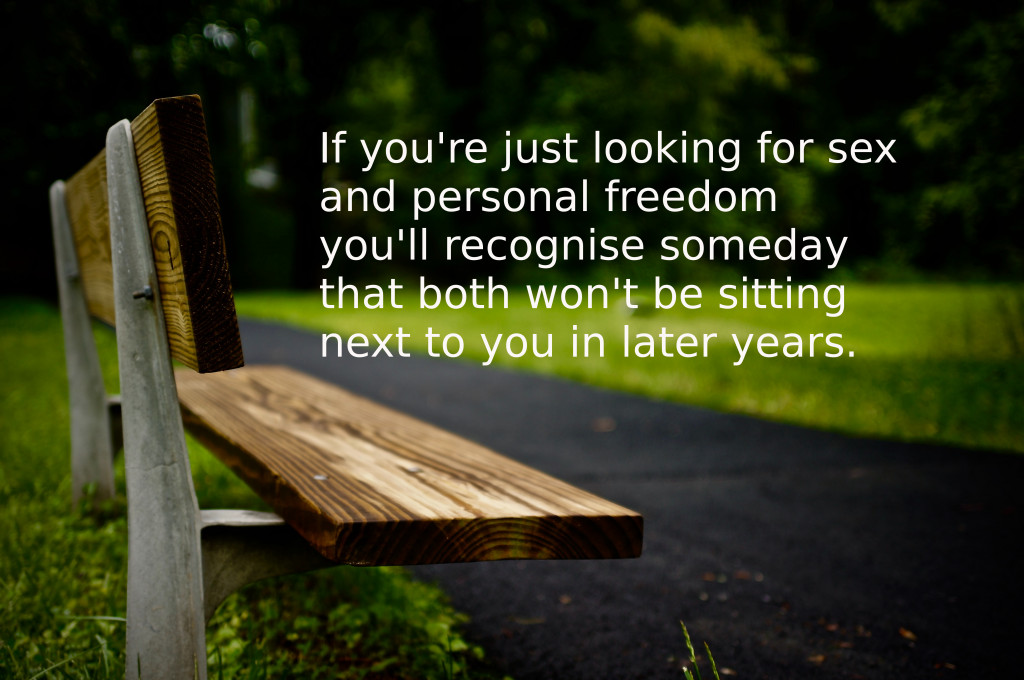Dating is as dating does…
Once again, Oligotropos is dating.
No,
stop.
In fact, he does not yet date. He’s roving around on dating
platforms first of all. At least this time on websites that guarantee
both monogamous and non-monogamous variations of search options.
So
far, so good.
However, after he has viewed half a dozen profiles
he is struck by a peculiar tentativeness, when he realises that his
“oligoamorous search” has deeper inner implications of its
own on such websites:

Level 1 – Monogamy as an example: Almost all dating sites seem to have been made for monogamy. I don’t think that dating there is really easy for monogamous people – but all the criteria seem to be tailored to monogamy: Jack is looking for Jill – or Jill is looking for a Jack. Women or men are searching for the „one special person“. And if two people find each other on such a site in this way, they get together and both disappear from the pool of potential seekers – in order to do henceforth those things monogamous people usually do together. Accordingly, we can dismiss those people furthermore from our story, since first of all they will sally forth inevitably in pairs and secondly we are not monogamous ourselves. Hence, we gaze after them somewhat admiringly, somewhat baffled: These two have “bonded” somehow – until who- or whatever will part them…
Level 2 – Non-monogamous / polyamorous search: To all the world this mode really sounds like great freedom par excellence. On this level it seemingly does not matter if I am a free atom or an already bound molecule when looking for further potential bonds.
Of course, there is some “homework” here one has to finish beforehand: One has to practice, or desire a relationships with more than one partner, with the consent of all partners involved. This practice or desire has to be seasoned by equality regarding all possibly involved parties, consistent assumption of responsibility for own risky behaviour (e.g. sexually) – plus a dram of commitment concerning the potentially emerging relationship-network and a longer-term perspective (otherwise occasional swinging or casual dating would do just as fine).
And then the merry dating may start. And all the people who feel like it and whose parameters fit my ideas of multiple relationships – and my parameters in turn to their ideas – may meet. If distance and/or logistics as well as communication with each other work out.
However, I, Oligotropos, as the author of this bLog, still find one-two-three snags regarding the relationships which this approach would enable. I have described these three “snags” in detail in Entry 2, because I have seen too often with regard to “Polyamory” that the relationships arising from such guidelines are often based on sexuality as the main (or sole) common interest, the involved parties are entangled in a unrealistic dictate regarding mutual non-possessiveness, and eventually personality-fragmentation is facilitated.
But it’s not my place to decide on the appropriateness of such relationships. The parties involved must decide for themselves whether the resulting kinds of connections are conducive to them (anyway). And for many configurations such polyamorous arrangements are also completely sufficient: Wether sexual freedom is acted out in a (established) relationship, while participating in the neotantric community or regarding BDSM-relationships, or even in terms of category-free relationship anarchy.
And that’s why I also believe that sooner or later this kind of search will lead to dating-success in the end. Because in this way people will get together who want to share selected special moments of their lives with each other: During leisure time or vacation, at events or workshops, based on accordance, shared interest and mutual passion.
Concerning myself, all that still wasn’t enough. Regarding my own peace of mind and peace of heart, Polyamory manifested too many discontinuities in terms of reliability/predictability, loyalty and sustainability (see Entries 3 + 4).
Moreover, contrary to its founding concept, “Polyamory” often no longer seemed to be regarded as a “relationship-philosophy” but as a kind of novel philosophy of love and personal freedom.
Influenced by a mix of ideas containing Zen-Buddhism, free love and the codependency-movement, in the 21st century considerations like the following started to affect the argumentative focus:
»A relationship is a structure. So love relates, certainly, but never becomes a relationship. Love is a moment-to-moment process. Remember it. Love is a state of your being, not a relationship. There are loving people and there are unloving people. Unloving people pretend to be loving through the relationship. Loving people need not have any relationship – love is enough. Be a loving person rather than in a loving relationship – because relationships happen one day and disappear another day. They are flowers; in the morning they bloom, by the evening they are gone. […] A relationship may be just out of fear, may not have anything to do with love. Relationships may be a kind of security – financial or something else. The relationship is only needed because love is not there. A relationship is a substitute. Be alert. A relationship destroys love, destroys the very possibility of its birth.¹«
Or:
»Real persons love each other as a luxury. It is no longer a need. They enjoy sharing: they have so much joy, they would like to pour it into somebody. And they know how to play their lives as a solo instrument.²«
“Poor Rajneesh!”, I would now almost exclaim loudly (see also Entry 8), “did you experience your relationships predominantly that way?” Because in the increasing human disability to attach and to relate as well as in the increasing rate of “solitaries” I currently see more of a problem than a visionary (re)solution.
And that’s one important reason why I set out to explore the “Oligoamory” for myself, especially with regard to the needs and wishes that I had concerning multiple relationships.
But that way I encountered new challenges while dating and looking for likeminded people. Or, at least, questions popped up I had to face.
Level 3 – Oligoamorous search:
Let’s counter these Rajneesh/Osho quotes above with a citation from the British actor Anthony Hopkins:
»None of us are getting out of here alive. So please stop treating yourself like an afterthought. Eat the delicious food. Walk in the sunshine. Jump in the ocean. Say the truth that you’re carrying in your heart like hidden treasure. Be silly. Be kind. Be weird. There is no time for anything else.«
What I particularly like about this quotation from the oligoamorous viewpoint is the direct reference to our deepest humanness with its joys – and to our finiteness.
Mr. Hopkins also says, “Stop treating yourself and each other like “afterthoughts”, like bonuses or “give-aways”. And he adds: Say the truth that you’re carrying in your heart like hidden treasure – by that he appeals to our radical honesty.
Precisely these two aspects seem to be of significant importance to me concerning the quest for potential lovers and soulmates in Oligoamory.
Because according to the principle “Do not do to others what you would not want them to do to you”, I do not want to be considered or treated as a “luxury” or a “bonus” at any rate. I am a whole, complicated person with my weaknesses and strengths and I wish to be accepted as such. Whoops, with that request I touched the second aspect as well: Because in order to be “accepted”, I must be able to accept myself just as sincerely. In Entry 26 and 27, I discuss how I can overcome my internal fragmentation in order to experience real closeness and true intimacy once again. And concerning that, the somewhat tenacious and relentless utilisation of straight self-honesty plays a major part.
Let’s assume that, according to Mr. Hopkins, we would be tolerably able to treat ourselves no longer “as an afterthought” because we managed to accept us and each other in our quirky-beautiful, definitely human, uniqueness, to which our valiantly applied honesty would significantly contribute.
Then, in return, this would clearly mean that our potential loved ones should be treated just as equally…
Upsa-daysie!
Since now we have stated an aspiration regarding our “search” and regarding possible dating, concerning which we ourselves have to do meet the requirements first:
Do I currently have the capacity in my life to appreciate a WHOLE (additional) person as such?
Maybe some people will think now: “Oh, please, dear Oligotropos, I would never ask anyone else for something like that, that he*she*it considers me in such a way. It would be enough for me if they would appreciate me as a good guitarist/surfer/bedfellow – whether I pay my taxes correctly or where I stand politically is quite unimportant in that respect…!”
Oh yes? Then you may(be) still get lucky in Polyamory – but in that case this website has nothing to offer for you. And do not complain any more about experiencing such a deep miserable inner discrepancy between pretence and reality – because you seem to favour a “Reality of separation” or at least a life far away from integrity and coherence.
I apologise for these outspoken words – but there are consequences, if we want to stand up for the equal well-being of all parties involved regarding the relationship level.
And it’s a good thing if we try to incorporate these consequences already at a very early stage, virtually unilateral while setting things in motion on our side.
Our goal of an “oligoamorous relationship” would be marked by the desire to find a (additional) person, who in this way becomes part of our “soul tribe”, becomes one of our “associates“. That way, we hope for a relationship that is characterised by familiarity and a level of intimacy that allows all participants to put off their “everyday-armor” in front of each other. In such a relationship, the affected people would be important to one another precisely because of the many little things that – according to the writer Antoine de Saint-Exupéry – would “gain the colour of wheat³ “: (Just) Seemingly insignificant details, which make the respective personality shine and highlight it in the view of the loved ones.
After all, every human relationship is based on the fact that in such relationships, beyond our visible achievements, beyond our successes and beyond our knowledge – and also beyond our sorrows and worries – we simply want to feel accepted as human beings. And, to be sure, not as a kind of validation from outside – here Osho and all his co-speakers err in my opinion – but as an encouragement and an assurance of our own inner acquired certainty regarding our value, the value that every other human being owns – without being diminished by anything or anybody.
Conclusion: That’s why for me as an oligoamorous-sensitive person online dating is more exciting and complicated than it could favourably be.
E.g. many websites appear to prefer a strategy that suggests multiple introductions to as many profiles as possible. I can’t do this without feeling somewhat incoherent and disloyal in a strange way: Every profile stands for a whole person (as I am behind my profile). And no two profiles or people are alike. That is why I think that each of these people has earned its own approach. Otherwise it would be a little bit as if I had yelled into a pub to a group of women “Hey girls!” And would hoped that one of them approaches me now because of my eloquent and individualistic speech…
And in fact, when I read a profile, I think about whether I have the capacity to be more than just a projection surface for the desires and needs of the other side – which in case of doubt would be badly thin veneer, which wouldn’t withstand any acid test.
And I’m always wondering if it’s a good moment for such a step right now in my life:
- Whether there is room for a WHOLE (additional) person in my already rich life (I recall the Anaïs Nin quote from Entry 6, “that each new person represents a world in us, a world not born until they arrive, and it is only by this meeting that a new world is born”).
- Whether I’ve tidied up my “inner space” sincerely enough to let a (additional) person in – or if I only provide a tight spot in front of my best-decorated showcase.
- Whether I am currently a secure harbour where another person can be safe enough to get rid of their “everyday armour”.
- Whether I have enough inner certainty that I do not have to cling to myself, in the panic of losing myself – but have both an arm for me and an arm for somebody else to welcome him*her*it, to encourage him*her*it – and to endure him*her*it.
¹ Osho/Rajneesh/Bhagwan, “Walk without feet, fly without wings and think without mind “, Talk #8
² Osho/Rajneesh/Bhagwan, “The Power of Love” He said /She said: Love in a relationship
³ Antoine de Saint-Exupéry: The Little Prince, Chapter 21, Excerpt from the Fox’s Speech: »But if you tame me, it will be as if the sun came to shine on my life. I shall know the sound of a step that will be different from all the others. Other steps send me back hurrying underneath the ground. Yours will call me, like music, out of my burrow. And then look: do you see the grain-fields down yonder? I do not eat bread. The golden wheat-fields have nothing to say to me. That is said. But yo have hair that is the colour of gold! Think how wonderful that will be when you have tamed me! The grain, which is also golden, will bring me back the thought of you. And I shall love to listen to the wind in the wheat…«
Thanks to Simon Müller on Pixabay for the photo!










